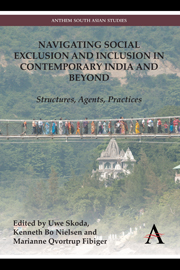 Navigating Social Exclusion and Inclusion in Contemporary India and Beyond
Navigating Social Exclusion and Inclusion in Contemporary India and Beyond from Part I - Spaces and Values
Published online by Cambridge University Press: 05 September 2013
The concepts of exclusion and inclusion are not only concerned with social or cultural processes where exclusion and inclusion strategies are used in an overall political framework and where individuals or a group of people are either included or excluded in relation to shared privileges. Exclusion and inclusion can also be seen as part of mobility strategies from within, where a group of people use exclusion and inclusion in a situation of cultural discontinuity, trying to find new ways of constructing meaning in a new setting (such changes may be necessitated by modernity, globalization, or a diaspora situation, etc.). In doing so, they also construct a shared understanding of belonging to a specific cultural, ethnic or religious tradition. This is an ongoing process of negotiation during which the understanding of belonging are redefined. This process can be found among all groups of people, irrespective of time or place.
This chapter will argue that these types of negotiations are most prevalent and profound among groups living abroad or in diaspora. In such cases, a tradition (whether religious, cultural or ethnic) becomes part of a society that does not share its history and that played no role in its formation. Therefore, the tradition is confronted first hand with various paradigms and worldviews, which, up until that point, it had not been part of. This does not mean that the tradition is lost; it is simply reshaped and, in this way, it remains part of an identity that connects its members to the country they have left.
To save this book to your Kindle, first ensure [email protected] is added to your Approved Personal Document E-mail List under your Personal Document Settings on the Manage Your Content and Devices page of your Amazon account. Then enter the ‘name’ part of your Kindle email address below. Find out more about saving to your Kindle.
Note you can select to save to either the @free.kindle.com or @kindle.com variations. ‘@free.kindle.com’ emails are free but can only be saved to your device when it is connected to wi-fi. ‘@kindle.com’ emails can be delivered even when you are not connected to wi-fi, but note that service fees apply.
Find out more about the Kindle Personal Document Service.
To save content items to your account, please confirm that you agree to abide by our usage policies. If this is the first time you use this feature, you will be asked to authorise Cambridge Core to connect with your account. Find out more about saving content to Dropbox.
To save content items to your account, please confirm that you agree to abide by our usage policies. If this is the first time you use this feature, you will be asked to authorise Cambridge Core to connect with your account. Find out more about saving content to Google Drive.